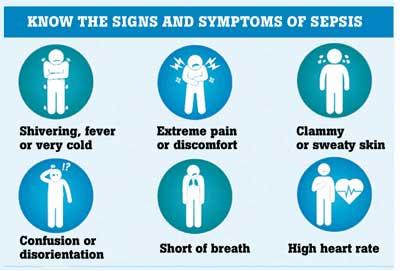25 Mar 2022 - {{hitsCtrl.values.hits}}
 Sepsis is an exaggerated response by the human body to an infection that results in multi system involvement and damage. It is a life-threatening medical emergency. Under normal circumstances, when faced with the threat of an infection, the human body responds by producing inflammatory substances to combat the problem. These inflammatory substances act on the affected area and the reaction is limited to the said area or organ. In sepsis, however, the inflammatory response gets out of hand, and a generalised response ensues, affecting even the normal tissues. Multiple systems get involved, and this systemic inflammatory overdrive can lead to septic shock which could be fatal without immediate and aggressive treatment.
Sepsis is an exaggerated response by the human body to an infection that results in multi system involvement and damage. It is a life-threatening medical emergency. Under normal circumstances, when faced with the threat of an infection, the human body responds by producing inflammatory substances to combat the problem. These inflammatory substances act on the affected area and the reaction is limited to the said area or organ. In sepsis, however, the inflammatory response gets out of hand, and a generalised response ensues, affecting even the normal tissues. Multiple systems get involved, and this systemic inflammatory overdrive can lead to septic shock which could be fatal without immediate and aggressive treatment.
Sepsis is common in hospitalised or recently hospitalised patients with severe infections. Although the infection leading to sepsis can be caused by pathogens such as bacteria, viruses and fungi, bacterial infections are usually the culprits in sepsis.
 Risk factors for sepsis include older age, infancy, immunocompromised states such as HIV infection, underlying malignancy and post-splenectomy immunosuppression, previous prolonged use of corticosteroids and antibiotics, presence of diabetes, chronic liver disease, chronic kidney disease, hospital admission of longer durations, admission to the intensive care unit, recent major surgery, insertion of invasive devices such as intravenous catheters and breathing tubes. Bacteria may enter the bloodstream through IV lines, surgical wounds, urinary catheters, and bedsores as well. Aside from the signs and symptoms specific to the initial pre-existing infection, clinical features include, but are not limited to fever, tachycardia (A heart rate of more than 100 per minute) an increase in respiratory rate (more than 30 breaths per minute in adults is considered to be an increased respiratory rate), low blood pressure and an altered mental status. A high lactic acid level in the blood is also an indicator of sepsis. Sepsis can be diagnosed through blood tests, x-ray, ultrasound and CT imaging as well. It should be noted that sepsis in elderly people or the immunosuppressed could occur without the classic clinical features of infection.
Risk factors for sepsis include older age, infancy, immunocompromised states such as HIV infection, underlying malignancy and post-splenectomy immunosuppression, previous prolonged use of corticosteroids and antibiotics, presence of diabetes, chronic liver disease, chronic kidney disease, hospital admission of longer durations, admission to the intensive care unit, recent major surgery, insertion of invasive devices such as intravenous catheters and breathing tubes. Bacteria may enter the bloodstream through IV lines, surgical wounds, urinary catheters, and bedsores as well. Aside from the signs and symptoms specific to the initial pre-existing infection, clinical features include, but are not limited to fever, tachycardia (A heart rate of more than 100 per minute) an increase in respiratory rate (more than 30 breaths per minute in adults is considered to be an increased respiratory rate), low blood pressure and an altered mental status. A high lactic acid level in the blood is also an indicator of sepsis. Sepsis can be diagnosed through blood tests, x-ray, ultrasound and CT imaging as well. It should be noted that sepsis in elderly people or the immunosuppressed could occur without the classic clinical features of infection.
Among infections that can cause sepsis, lungs infections such as pneumonia, infections originating from the kidney, bladder and other parts of the urinary system, infections of the digestive system, catheter sites, burn wounds and infections caused by bloodstream contamination are common. As sepsis worsens, blood flow to vital organs become compromised. Sepsis may also cause abnormal blood clotting that eventually leads to tissue damage in multiple organs. Kidney failure, dead tissue (gangrene) on fingers and toes due to inadequate perfusion of blood leading to amputation, lung, brain, or heart damage are a few of the complications of severe sepsis.
Most people recover from mild sepsis, but the mortality rate for septic shock is about 40%. The underlying cause must be identified and treated appropriately to prevent multi-organ failure.
People who have sepsis require close monitoring and treatment in a hospital intensive care unit. Intravenous fluids are given to preserve blood pressure. Vasopressors, which are medications given to constrict the blood vessels to improve falling levels of blood pressure, are added when the blood pressure remains dangerously low even after receiving the intravenous fluids. Antibiotics are given to treat the infection that caused the inflammation in the first place. Supportive care with oxygen may be required. Patients whose kidneys have been affected may require dialysis. For patients in whom the source of infection is an infected dead tissue or accumulated pus due to an abscess, surgery would be warranted to remove the said source.
Practicing good hygiene by washing hands, bathing regularly and keeping the wounds (if any) clean and disinfected, getting vaccinated against flu, pneumonia, and any other potential infections, especially if there are pre-existing risk factors, go a long way in preventing infections and sepsis. If there is an infection that seems to progressively worsen, seek medical attention immediately, as early intervention yields better outcomes.
20 Dec 2024 2 hours ago
20 Dec 2024 3 hours ago
20 Dec 2024 4 hours ago
20 Dec 2024 5 hours ago
20 Dec 2024 6 hours ago